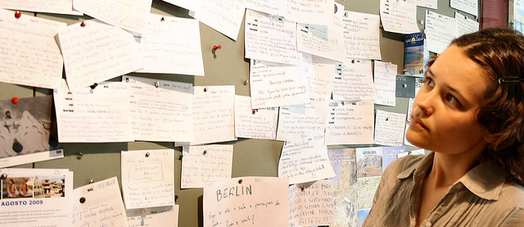
Attention is scarce and so called information is being thrown at us at exponentially growing speed. So I guess it is fair to assume we'd rather not pay attention to made up stuff, only discovering later that it is all bullshit (or low quality entertainment ;) ).
Todays tools for filtering are mostly using quantitative methods to help you find the right stuff, not really smart and effectively using ad populum reasoning for deciding about what is right - which is a fallacy.
Singularity, the moment when computers outsmart humans, could be really good for us. Singularity is not, or should not be, about machine vs. man, but about how the machine can extend man (in certain tasks) with its ever expanding resources. Allowing us to focus on what is really important (or enjoyable).
If we can only trust the machine. Or the driver of that machine (paraphrasing [Douglas R…
- shared 12 May ´17 Uncensorable Wikipedia on IPFS
- delicious 03 May ´16 ScraperWiki
Increasing the haystack
Facebook is doing another tweak on the timeline algorithm because they want "to show people the most interesting stories at the top of their feed". Ok, sounds fair.
But then their announcement says: "Through testing, we have found that when people see more text status updates on Facebook they write more status updates themselves."
In other words: updates invite updates. It doesn't work for pages, though, as they "noticed that this effect wasn't true for text status updates from Pages." Guess people want to be as noisy as their friends. We're social animals. But pages are not animals, so we won't be as noisy as them. Hence we'll receive more animal/friends-updates and less from pages. Even though some of the pages you'll probably follow/liked because they're so damn informative, more informative than your ever bullshitting friends :)
Anyhow, recap. So Facebook changed the algorithm to show people the most interesting stories and hence they tweaked the algorithm in such a way…
- delicious 11 Feb ´12 Europeana - Homepage
- delicious 11 Feb ´12 Europeana - Homepage
- delicious 28 Oct ´11 Research: How to Tell Stories with Data? - information aesthetics
- delicious 28 Oct ´11 Research: How to Tell Stories with Data? - information aesthetics
- delicious 23 Jan ´11 Baseline
- delicious 23 Jan ´11 Baseline
On micro magazines
Yesterday, Seth Godin was making an
argument for micro magazines, which he defines as digital (e.g.
PDF), subscriber based (e.g. RSS or email), focussed, community and ad
supported containers of well written pieces. The concept of magazine
seems to revive electronically. With the launch of the iPad many
publishers are rushing out electronic, slightly more interactive,
equivalents of their paper based media. I don’t really mind they are
doing it, it saves paper and distribution costs.But I am not excited
either.The main reason that I am not excited about the electronic (micro)
magazines is because of the difficulty of ‘sharing’ in the non web
formats they use. Sharing an article from an iPad app, or from a PDF, is
harder than just bookmarking it, or sending the link to a friend. Or
starting a discussion around a linked article. There is no uniform
interface.Yes, there is hardly an end to all the content that is published online.
But I don’t see …
- delicious 14 Dec ´09 5 years of infosthetics
- delicious 14 Dec ´09 5 years of infosthetics
- delicious 14 Dec ´09 visualcomplexity.com | A visual exploration on mapping complex networks
- delicious 14 Dec ´09 visualcomplexity.com | A visual exploration on mapping complex networks
- delicious 11 Sep ´09 User Interface Design Patterns: Groups and Items
- delicious 11 Sep ´09 User Interface Design Patterns: Groups and Items
- delicious 05 May ´07 A Periodic Table of Visualization Methods
- delicious 05 May ´07 A Periodic Table of Visualization Methods
Folksonomies
In recent times, a huge number of websites has begun to generate extraordinary amounts of new content through web logs, Wikis and other social tools. The websites supporting this type of content generating is gaining hype and are emerging rapidly on internet. In this content generation, increasing amount of valuable content is generated not by trained writers and experts, but by non-trained and non-expert information professionals. Not only is original content being generated, community efforts are also generating fast amounts of content-describing data (meta data). While this was formerly only the task of trained professionals making use of well specified taxonomies, now large numbers of non-professionals are annotating with what is called “folksonomies”. In this essay we try to clarify what folksonomies bring to information architecture community and what it entails in collaborative work environments. The piece of content that describes other con…
Invloed van presentatie op informatie-overdaad (overload)
Informatie-overdaad is het beschikbaar hebben van zoveel informatie dat een persoon de informatie of echt niet aan kan, of wordt overvallen door dit gevoel - Pearson Education Glossary, vert. 2005
De rol van informatie in onze maatschappij neemt steeds verder toe. Bij het maken van beslissingen is het hebben van de juiste informatie steeds belangrijker. Wanneer informatie slecht wordt gepresenteerd leidt dit tot verwarring. In het uiterste geval kan deze verwarring een consument er zelfs van weerhouden producten te kopen of diensten af te nemen. Dit is mijn reden waarom ik onderzoek naar informatie-overdaad zo belangrijk vind.
Informatie-overdaad kan ondermeer bestudeerd worden vanuit de complexiteit van de inhoud, de context (zoals de diversiteit van de keuze opties) en de presentatie vorm (b.v. grafisch of tabellarisch). Het doel van deze paper is het krijgen van inzicht in de rol van presentatie in het veroorzaken van informatie-overdaad. Hierbij zal ik aspec…
Dit artikel van murblog van Maarten Brouwers (murb) is in licentie gegeven volgens een Creative Commons Naamsvermelding 3.0 Nederland licentie .